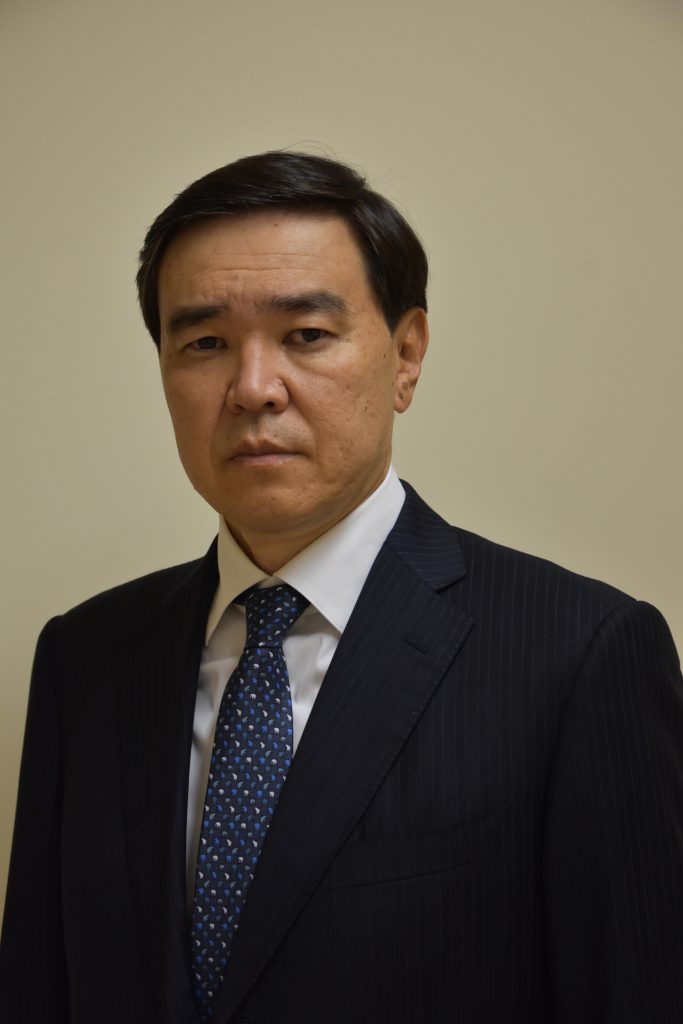
On the occasion of Kazakhstan’s 29th Anniversary of independence, Ambassador of Kazakhstan to Singapore His Excellency Arken Arystanov (below) shares some thoughts about the current uncertainties amid the Covid pandemic while also looking optimistically to the future as the country adapts quickly to the new realities and prepares itself to meet the challenges ahead

It is my privilege to share with you the current development of Kazakhstan as we celebrate Kazakhstan’s 29 years of independence, including the successes and failures of our country’s journey.
Kazakhstan has been fortunate to have a very optimistic outlook for 2020 and the decade ahead despite some obvious challenges arising from structural changes in world security and economy, the rise of protectionism and other factors. We have a strong base for growth and we are benefiting from our status of having the most robust economy in Central Asia (making up 70% of total Central Asian GDP), the availability of a high quality labour force, access to huge markets, good relations with global and regional powers and neighbours and our active participation in various international organisations.
CENTRAL ASIA’S STRONGEST ECONOMY
5000+ unexplored deposits, valued at over US$ 46 trillion (The World Bank) 1st in the world in explored reserves of zinc, tungsten and barite, 2nd in silver, lead and chromite and uranium, 3rd in copper and fluorite, 4th in molybdenum, 6th in gold, 8th in coal, 9th in proven oil reserves. Among the global top 10 exporters of grain, one of the leading exporter of flour.
In addition to that, at the beginning of 2020 we had a very good starting position in international ratings, which was a result of thorough, ongoing reforms in our political structure, economy and social policies.
Kazakhstan was ranked 25th in the world according to the World Bank’s Doing Business report in 2019. Our 55th position in the Global Competitiveness Index in
2019 gave a great impetus to further reforms as we continue our journey to become one of 30 most developed countries in the world by 2050.
INTERNATIONAL RATINGS
• $24.1b Gross Direct Investment Inflow in Kazakhstan in 2019
• 25th in the World Bank’s Doing Business report in 2019
• 1st in the world for cost effectiveness in fDi Manufacturing Locations of the
Future report
• 4th for enforcing contracts
• 7th for protecting minority investors
• 22nd for starting a business
• 24th for registering property
• 31st on the human capital index
• 37th for dealing with construction permit
• 55th in the Global Competitiveness Index in 2019
The unpredictability of 2020 caused huge changes in the trajectory of our development as Kazakhstan was pretty hard hit by the pandemic. Our Republic has gone through a series of local lockdowns of regions and cities that resulted in negative growth of GDP. It caused the restructuring of business models and a decrease in trade and services and mining. The oil prices occasionally crashed into negative territory. The volatility in growth and trade remains, and may last till 2022.
Small and medium enterprises are the hardest hit, many of whom may not survive through these hard times. That is why the government of Kazakhstan, like the government of Singapore, made great investments in economic resources, eased tax burden, gave direct financial support to our people as well as enterprises. The biggest loss is, of course, the loss of lives, and the toll could arguably be lower if only we had better understanding of the Covid-19 threat.
COVID IMPACT
We need to accept that the world has struggled to deal with the pandemic. Kazakhstan is open to any cooperation in order to make the anti-Covid vaccine available to everybody in the shortest time possible and to better prevent and fight future pandemics.
However, I would like to add that the crisis has some positive impact on us. First of all, Kazakhstan now has the experience and a better understanding of how to deal with such pandemics. On Kazakhstan’s economic front, various sectors are growing despite the shrinking of the world economy. For example, the manufacturing industry grew by 3.2%, of which food production grew by 3.4%, pharmaceuticals by 39.7%, production of finished metal products by 19.5%, mechanical engineering by 16.5%, including the automotive industry by 53.6%, as well as paper products by 15% and light industry by 16.4%.
Construction volumes increased by 10.7%, housing commissioning by 9.7%, or about 10.7 million square metres. In agriculture, a steady growth of 5.2% was achieved. The gold and foreign exchange reserves of the Republic of Kazakhstan and assets of the National Fund as of October 1, 2020, amounted to $91.1 billion. The most important change is the growth of investments in non-mining sectors.
GROWTH OF INVESTMENTS
Healthcare by 85.7%
Communication by 62.4%
Housing Construction by 30%
Transport by 8%
Processing by 11%
Food Processing by 20%
Agriculture by 15%
Of course, it is hard to tell how things will evolve in 2021. However, it is clear that there is no return to the pre-Covid situation. Countries, including Kazakhstan, need to better prepare for the post-Covid world and rapid technological revolution.
We believe that we will definitely overcome our current difficulties. Thus we will shift our focus to the long-term development of our state in the new geopolitical reality. In his Address to the Nation on September 2, 2020, President Kassym-Jomart Tokayev stressed the priority of Economic Development in New Realities.
NEW FOCUS FOR FUTURE
The Address focuses on a main task that is absolutely essential – developing a truly diversified, technological economy that aims to improve the well-being of the people, and provides effective social “lifts”. To this end, the President outlines seven basic principles of the new economic course of our country.
THE SEVEN BASIC PRINCIPLES OF KAZAKHSTAN’S NEW ECONOMIC COURSE
1. Equitable distribution of benefits and responsibilities.
2. The leading role of private enterprise.
3. Fair competition, opening markets for a new generation of entrepreneurs.
4. Increased productivity, increased complexity and technological effectiveness of
the economy.
5. Development of human capital, investment in a new type of education.
6. “Green” economy, environmental protection.
7. Adoption of well-grounded decisions by the state and responsibility for them before society.
Continuous upgrading of competitive industries, digitalisation of every sphere of life, accessible and high quality education, improvement of every other aspect of life and government’s functions are indispensable essentials of our reforms.
As the topic of national food security is very close to Singapore, I would like to outline some important achievements by our local businesses as Kazakhstan looks into promoting more active cooperation with Southeast Asia in this area.
The export of food products to member countries of the Shanghai Organization for Cooperation amounted to $1.3 billion during the first 8 months of 2020. We succeeded not only in overcoming the problem of border lockdowns but also became a main resource of food stability for our neighbouring countries.
According to the Food and Agriculture Organization, Kazakhstan fed 45 million people around the world. In addition to that we delivered to neighbouring countries more than 10 000 tons of wheat flour as humanitarian support. The priority in agriculture and food production is on the growth of production as well as the improvement of quality.
According to the European Commission, Kazakhstan is the top exporter of organic wheat and oil flax seeds, and the ninth biggest exporter of organic agricultural products to the EU. The exciting news is, we are developing into an international agricultural hub.
Kazakhstan also provides a suitable platform for investors around the world to enter the huge neighbouring market of close to 1 billion people living in close proximity to Kazakhstan. The political and economic stability, predictability and opportunity to enjoy the Common Law in this region provided by the Astana International Financial Centre (AIFC) are key benefits.
Amid the pandemic and global economic crisis, Hyundai launched production of its cars in Almaty. The plant was built within the framework of the State Programme for Industrial and Innovative Development of the Republic of Kazakhstan. The capacity of the enterprise at the first stage is 30,000 cars per year, at the second stage – up to 45,000 cars per year. And may I add that the export of cars from Kazakhstan rose this year by 5.7 times.
Despite the global economic situation, Kazakhstan has performed well in other spheres as well. The opening of the financial market, the growth of SMEs and the role of Astana International Financial Centre (AIFC) is developing Kazakhstan into a technological hub with huge potential.
Some may doubt that Kazakhstan is well adapted to the IT revolution. However, I would like to stress that the integration of IT solutions in our nation’s everyday life is accelerating. The example of Kazakhstan’s fintech firm Kaspi’s IPO on the London Stock Exchange and AIX in October 2020 gives a very good understanding of how new technological solutions, including cashless payments, e-Commerce and digital financial services, can easily become a new normal way of life.
Kaspi operates the most popular mobile app in Kazakhstan – Kaspi.kz Super App. While the population is 18 million, the app’s active users total up to 8 million. This means that Kaspi enjoys an ecosystem and market-leading Payments, Marketplace and Fintech platforms.
Kaspi.kz is valued at $6.5 billion on the London Stock Exchange, making it Kazakhstan’s most valuable publicly traded company. It was the second largest IPO of the year, and the fourth largest in all of Europe. In order to keep pace with global fintech trends, the AIFC participated in the Unprecedented Map of Blockchain Standards’ Release, the first and most comprehensive effort to assess the current state of blockchain.
OPPORTUNITIES FOR COOPERATION
With our growing strengths in fintech, Kazakhstan is ready to cooperate with Singapore in the spheres of green energy and global climate solutions, using the instruments of Green Bonds and AIFC Green Finance Center. I am happy to highlight that Singapore and Kazakhstan already have an important start in cooperation in technological innovations and solutions and the growth of start-ups.
An international accelerator Kazakhstan Digital Accelerator was launched within the framework of cooperation between QazTech Ventures JSC and Singaporean fund Quest Ventures. The goal of KDA is to promote start-up projects to the global market and develop the digital ecosystem of Kazakhstan.
In total, about 200 applications from Kazakh and international startups were received for participation in the programme, of which 10 finalists received support for the development of their projects in the amount of 50 thousand US dollars. The second stream of the KDA acceleration programme has been announced recently.
It is hard to predict when the pandemic is going away and even harder to foresee if the situation will revert to normal. I highly commend the leadership of Singapore for what it is doing to ease the current hardships and its efficiency in taking precautionary steps to prevent a new wave of Covid.
As there could possibly be no return to the old normal, we must adapt to the new circumstances. We believe that new supply chains afford fresh opportunities. Singapore is already benefiting from close contacts with ASEAN partners.
Last November, the Regional Comprehensive Economic Partnership (RCEP) was signed and opened new perspectives on regional and global development.
Kazakhstan is also looking into opportunities to work closer with South-east Asia through better connectivity and active cooperation. As a member of Eurasian Economic Union, we already have an FTA with Singapore and are prepared for the start of new dynamic collaborations after the pandemic.
In the meantime, we will continue to work with Singapore on joint projects that will prepare the ground for further cooperation, and we are open to new ideas and proposals.












